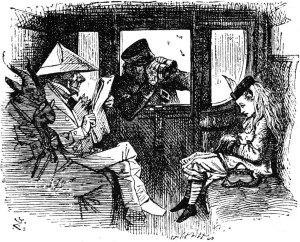Ye blind guides, which strain at a gnat, and swallow a camel.-Matthew 23:24
 Sex worker rights activists hear a lot of arguments against decriminalizing our profession, absolutely none of them sound or reasonable (no matter what those who use them may believe). Most of them are based in one religion or another, and by religion I mean any belief system which is unsupported by (and may even fly in the face of) verifiable facts; others are rooted in the ever-popular desire to control women’s sexuality, arguments that prostitution somehow causes harm to a nebulosity like “public decency”, or the indefensible belief that personal aversions should be forced upon others at gunpoint. Some of these arguments are wholly ridiculous, while others have the appearance of sensibility to those who are ignorant of either the realities of sex work or the inevitable and unintended consequences of any attempt to proscribe certain behaviors by the use of brute force; one of the most popular prohibitionist strategies of the past few decades falls into the latter category. Any advocate who presents a compelling moral, legal and practical case demonstrating categorically that decriminalization is better for everyone – sex workers, clients, families of both, health officials, society at large and even government treasuries – can be sure that once every other argument is defeated someone will intone sonorously, as though it were an unanswerable question, “But what about the trafficked children?” And though this one is no more valid than the others, its emotional impact often flusters even experienced advocates and triggers a reflexively apologetic stance which may well undermine everything she has previously said.
Sex worker rights activists hear a lot of arguments against decriminalizing our profession, absolutely none of them sound or reasonable (no matter what those who use them may believe). Most of them are based in one religion or another, and by religion I mean any belief system which is unsupported by (and may even fly in the face of) verifiable facts; others are rooted in the ever-popular desire to control women’s sexuality, arguments that prostitution somehow causes harm to a nebulosity like “public decency”, or the indefensible belief that personal aversions should be forced upon others at gunpoint. Some of these arguments are wholly ridiculous, while others have the appearance of sensibility to those who are ignorant of either the realities of sex work or the inevitable and unintended consequences of any attempt to proscribe certain behaviors by the use of brute force; one of the most popular prohibitionist strategies of the past few decades falls into the latter category. Any advocate who presents a compelling moral, legal and practical case demonstrating categorically that decriminalization is better for everyone – sex workers, clients, families of both, health officials, society at large and even government treasuries – can be sure that once every other argument is defeated someone will intone sonorously, as though it were an unanswerable question, “But what about the trafficked children?” And though this one is no more valid than the others, its emotional impact often flusters even experienced advocates and triggers a reflexively apologetic stance which may well undermine everything she has previously said.
The most serious flaw in this line of attack (it cannot legitimately be called an argument) is the implication that decriminalization somehow harms coerced prostitutes, especially underage ones; in reality, nothing could be farther from the truth. When any business or consensual behavior is criminalized, the law lumps good people together with bad: a punter who is kind and generous is equated with brutal or dishonest ones; an ethical escort service owner who treats her employees fairly is just as “criminal” as one who coerces workers and cheats clients, and so on. The primary tool of control for those who exploit women is not physical abuse, rape, drugs or black magic as the various narratives pretend: it is threat of exposure to the “lawful authorities”. Those who are in a county without proper papers are subject to arrest, confinement and deportation, and under criminalization regimes like that of the United States just being a sex worker is illegal, so police are just as likely to arrest a coerced woman as one who adores her job. Clients or workers under decriminalization are free to report violence or suspected coercion to the police, while those under even partial criminalization are not due to fear of arrest. Furthermore, criminals are often attracted to criminality; in other words, those who are comfortable making a living outside the law are more likely to take advantage of the higher profits inherent in a black market, so that criminalizing any business actually attracts shady characters who might not otherwise be interested in it. Simply put, making sex work wholly or partially illegal tends to attract the sort of person who doesn’t mind coercing others; make maid service illegal and there will almost certainly be a rise in the number of coerced, underage domestics.
Another thing that needs to be pointed out is that despite the claims of prohibitionists, the vast majority of sex workers are no more coerced than anyone else without a well-padded trust fund; we all need to work, and we choose the work that suits us best (even if that work is highly unappealing to others). Less than 2% of all prostitutes are coerced in any meaningful way, and only about 8% of even underage prostitutes report having been coerced into the trade by any person (a number which has, incidentally, remained relatively stable since at least Edwardian times). And despite sensationalized claims to the contrary, only about 3.5% of all prostitutes in Western countries are below 18, and the majority of those are 17; the average age at which a so-called “child prostitute” enters the trade is 16, not the oft-cited 13. In other words, the fraction of all Western sex workers who could be described as “trafficked children” in even the loosest and least accurate sense is less than 0.3%. Criminalizing an entire type of human activity because of the exploitation of a tiny minority of those involved in it not only exacerbates the problem (see the paragraph above this one), it also sets an impossible precedent; if you consider it a valid response I suggest you learn to grow your own food, make all of your own clothes and chuck your iPhone in the bin (because if you sell it you are also profiting from exploitation).
not only exacerbates the problem (see the paragraph above this one), it also sets an impossible precedent; if you consider it a valid response I suggest you learn to grow your own food, make all of your own clothes and chuck your iPhone in the bin (because if you sell it you are also profiting from exploitation).
The third, and perhaps most subtle, problem with this rhetoric is its philosophical bankruptcy and appeal to bigotry. The Australian activist Cheryl Overs has already expressed this much more effectively than I could:
…even in that overstudied “hotbed of sex trafficking” Cambodia, the only credible study [showed that] less than 2% of sex workers say they had been sold or coerced (CACHA 2008). How might this compare to the percentage of married women who were forced into marriage – even in the “hotbeds” of forced marriage? What percentage of gay men have been forced into sodomy? We don’t know, but clearly both happen. But it would be absurd to preface the words “bride” and “gay man” with “willing” or “consenting”. Can you imagine reports that say that condoms should be distributed to “consenting homosexuals”? Can you think of anything more absurd, more homophobic or more stigmatising? Can you think of anything more absurd than describing Kate Middleton as a “willing bride”? Positioning “willing” and “unwilling” doesn’t contribute to justice for people who have been raped, beaten [or] imprisoned in the course of either marriage [or] homosexuality and no one would suggest that. Nor would anyone suggest that rejecting the terms “willing brides” and “consenting homosexuals” amounts to a denial that those things happen. Yet this is exactly what the trafficking paradigm sets out for sex workers…
It is a sad fact of human existence that some people hurt and abuse others, sometimes for emotional reasons and sometimes for political or economic gain; it is also a fact that there is opportunity for coercion in virtually every human activity. The solution to this is not to retreat like frightened rabbits into dark warrens, nor to empower the state to police every human interaction in the vain hope that this will somehow help more people than it will harm; on the contrary, the solution is to stop trying to control everything and everybody, so the law is able to focus on those cases where one party has clearly wronged another. It is long past time for the blind guides of our society to stop expending so much effort in straining at gnats that they regularly swallow camels.
(This column previously appeared in Cliterati on February 10th.)
